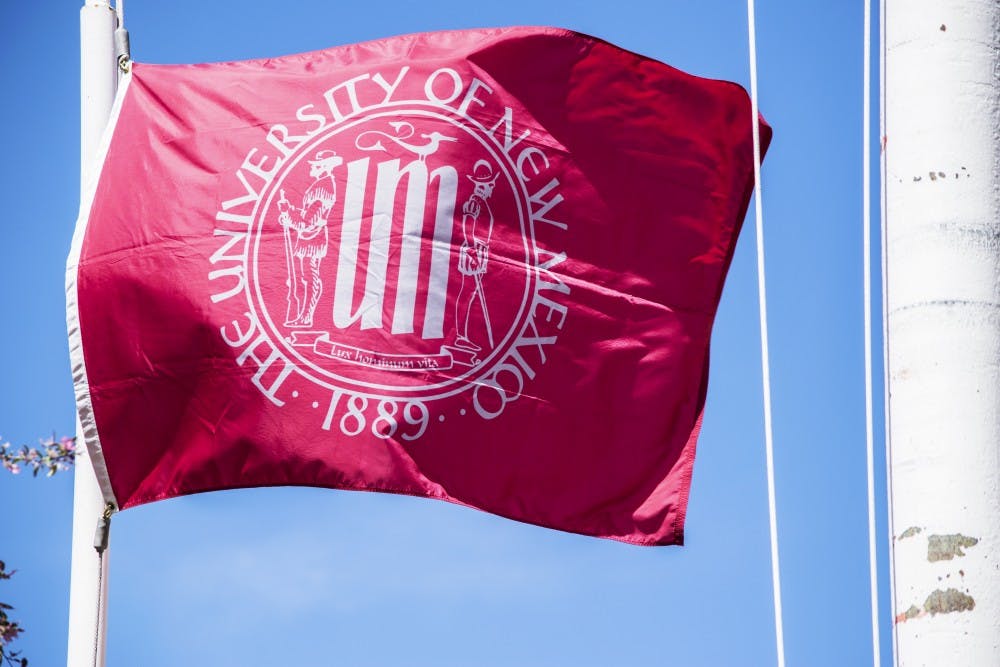The Red Nation and Kiva Club are campaigning to abolish the UNM’s official seal, saying it is racist towards Native Americans.
“The UNM [official seal] celebrates genocide and conquest — both are violations of basic human rights and belong in a museum of a bygone era,” said The Red Nation co-founder Nick Estes. “It’s 2016 and UNM is still celebrating crimes against humanity – colonialism and genocide – and Natives are still underrepresented at all levels at the University.”
Kiva Club is a student organization that provides Native American students at UNM with a social and supportive space. The Red Nation is a Native American-led, local activist organization “dedicated to the liberation of Native peoples from capitalism and colonialism,” according to their website.
Many UNM students are members of The Red Nation, including Estes.
Cody Artis, a senior earth and planet sciences major and Kiva Club member, said the groups are accusing the seal of racism for neglecting to represent indigenous people.
“There is a history of unity between all the nations, but you don’t see that [in the seal]. Where’s the unity of Spanish, White and Indigenous, where’s the unity of all the cultures that come to this campus? It’s not represented,” he said.
Jennifer Marley, a sophomore Native American studies major and also a Kiva Club member, said the fight to abolish the seal – which depicts a frontiersman and a conquistador – has been reoccurring for decades, and that these groups don’t plan on stopping until they succeed.
“Kiva Club has been working on abolishing the seal since the 60’s,” she said. “There used to be town hall meetings and panels with American Native student services and Native American studies department to talk with administration about getting rid of the seal, but nothing was ever done.”
The groups’ action plan is to gain support and momentum via a petition they can present to University leaders.
“Right now we have set plans of action,” Marley said. “There is a community forum on April 3 calling as many community members as we can to action to talk about sets for moving forward in the campaign. Our plan for right now is a petition we have out now, both online and physical.”
The groups have made a list of demands to go with their call to abolish the seal, she said. The groups have had a lot of feedback from the Native community asking what abolishing the seal is going to do, if it would really change anything.
Marley said when it comes down to it, abolishing the seal is not going to stop the racism on campus, nor is it going to cause widespread change for Native Americans.
Get content from The Daily Lobo delivered to your inbox
“But it will stop mocking Native Americans,” she said. “The paper that legitimizes all of our hard work is something that mocks us, it’s something that celebrates the deep colonial violence that we are all affected by,” she said.
The demands that are attached with abolishing the seal include the reconstruction of the Native American cultural center, formation of a council of elders at the Board of Regents comprised of leaders from surrounding pueblos and the demand of tuition waivers for federally recognized tribes.
“We hope to see it spawn other actions; this isn’t just a Native issue. We hope to see other groups on campus call for changes to their cultural status as well. We want this to be an on-going thing, not just one action,” said Marley.
Representatives of both Kiva Club and The Red Nation said they want their campaign to open the UNM administration’s eyes to other issues on campus, such as the lack of regulations over hate-crimes.
Hope Alvarado, a member of both groups, said UNM does not have a no-tolerance law for hate-crimes.
“There is no legislation in place against hate crimes. When there is very prominent forms of racism still occurring regardless how it is portrayed, there is no reprimand for that and that is unacceptable from an institution as UNM. We should be able to make everyone that is on this campus feel comfortable here,” he said.
The Board of Regents must approve any changes to the seal before action is taken.
Under state statute section 21-7-4, the Regents hold the power “of making and using a common seal and altering the same at pleasure.” This authority is expressed in policy for the Regents, which states that, “The seal cannot be altered or modified except by authorization of the Board of Regents.”
Director of UNM Policy and Administrative Planning Pamina Deutsch said that the current seal was “formally ratified” by the Board of Regents in September 1969. The current seal replaced a former one, which the Regents said “was so complex as to make reproduction difficult.”
Further, the former seal was deemed “incorrect in several basic details of heraldry.” The current seal “is the design of the presidential medallion,” according to Regents documents.
Deutsch said both the old seal and the current seal have the same figures of the conquistador and frontiersman.
Native American artists have a role in the seal’s history, as well.
Deutsch said in 1994 the Regents granted a Meritorious Service Medal to Theda Douglas Rushing, an indigenous artist who researched, designed and sewed the University’s first official seal.
“She later designed, crafted and contributed to a new University seal,” Deutsch said.
Estes said she hopes the Board of Regents develops a conscience to say that celebrating genocide, slavery, and colonization is not only wrong, “it is a violation of Indigenous rights.” The group in the past has also advocated for UNM student government leaders to abolish the University’s recognition of Christopher Columbus Day in favor of a day in remembrance of the struggles of indigenous peoples.






